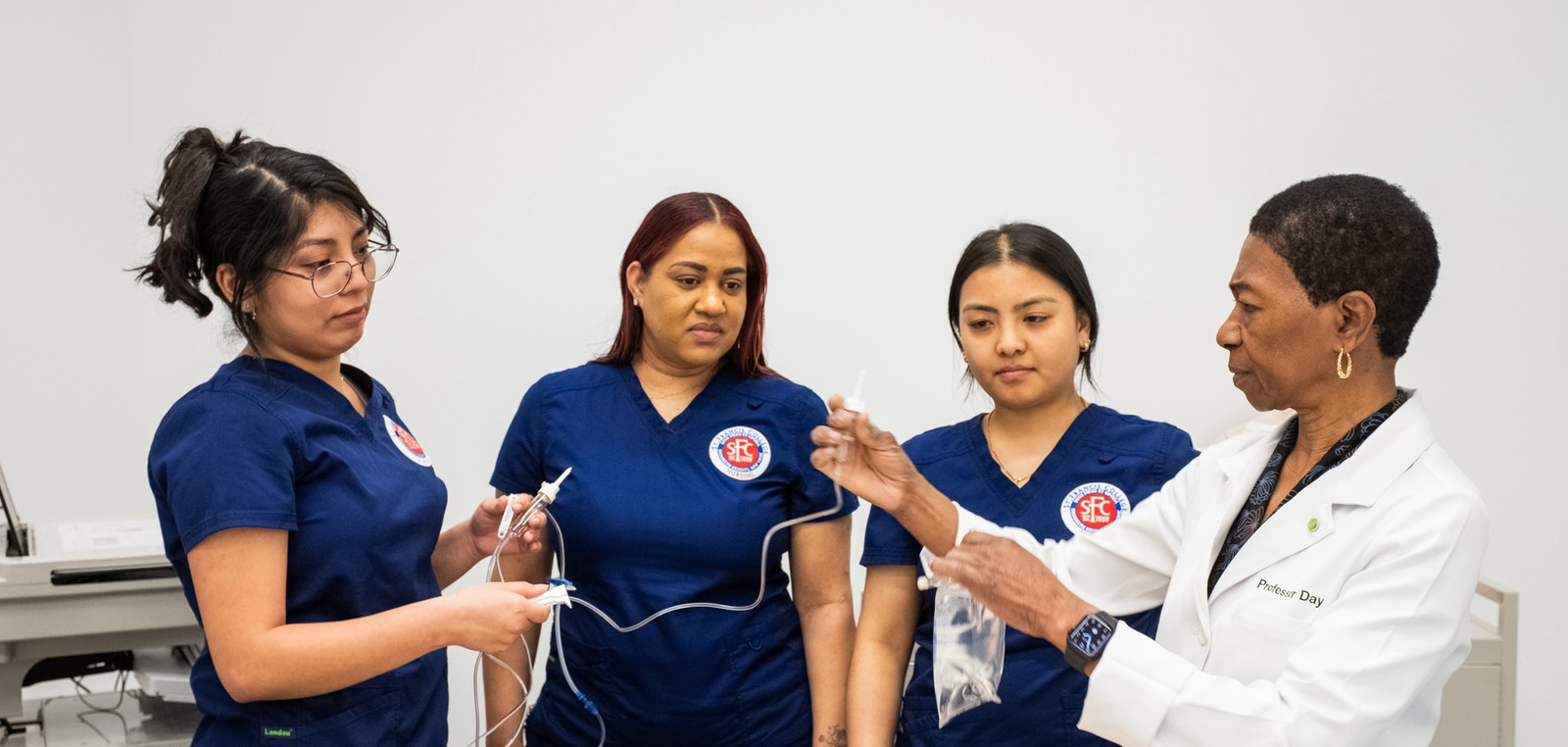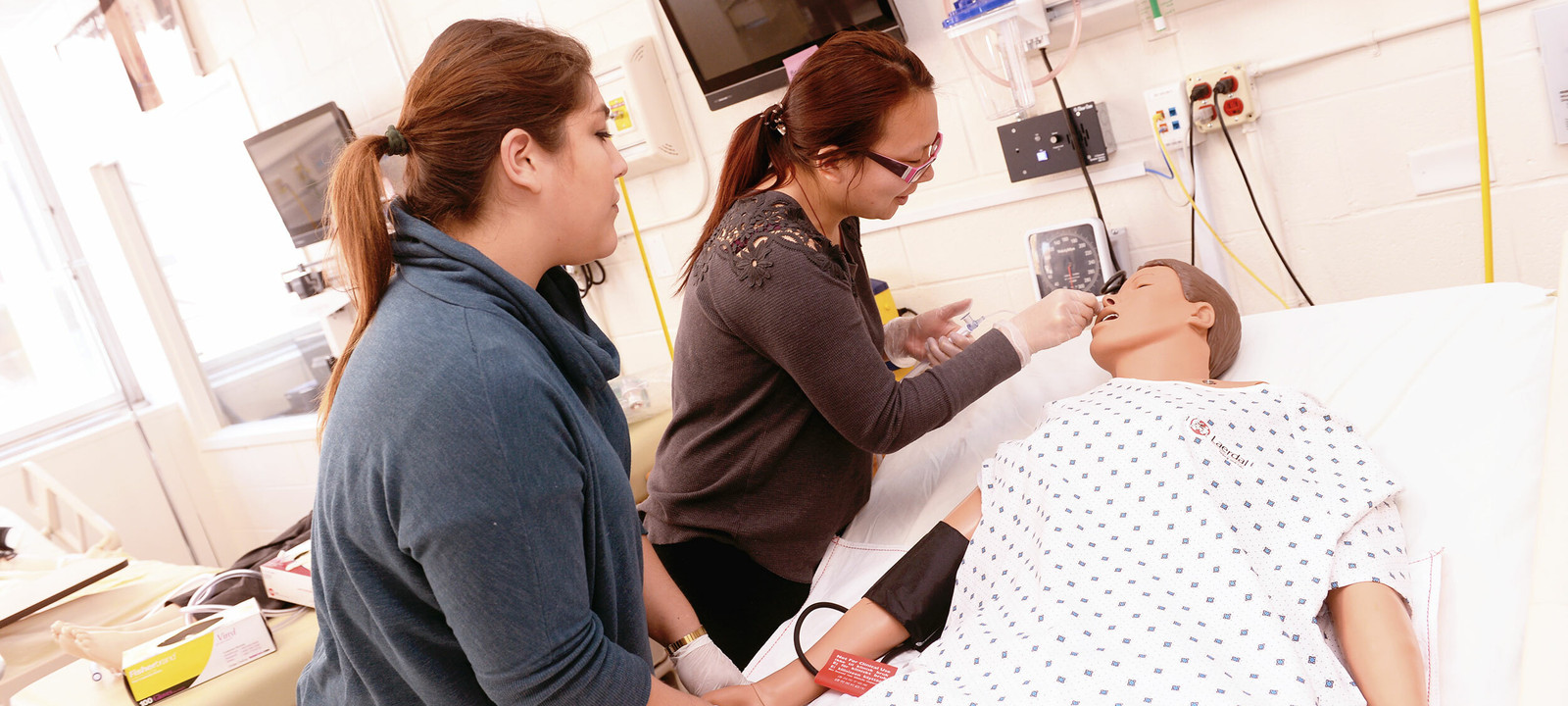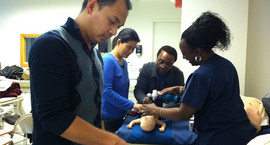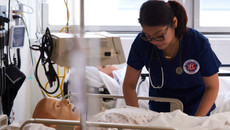
Nursing

Preparing for
an impactful career
Inclusive
Hands on
Outcomes-driven
Department of Nursing Mission
The St. Francis College (SFC) Department of Nursing educates leaders who are prepared to practice safely within the technologically advanced and dynamic healthcare environment of the 21st century. SFC nursing graduates, in keeping with the Franciscan values, are educated to be globally minded, service-driven professionals, delivering the highest quality of evidence-based nursing care with respect to the diversity within our communities of interest. The St. Francis College undergraduate nursing program fosters students’ abilities in therapeutic communication, critical thinking, clinical judgment, interprofessional collaboration, leadership, and cultural competency.
SFC Mission and Goals
Mission
St. Francis College is an inclusive and diverse institution of higher education rooted in a commitment to academic excellence, compassionate hospitality, and ethical leadership. Inspired by St. Francis and St. Clare of Assisi, and founded by the Franciscan Brothers of Brooklyn, the College prepares students to serve and thrive in a global community and help shape a just society.
Goals
Recognizing the original Franciscan understanding of hospitality as a challenging, risk-taking social contract, SFC strives for gradient and appreciable success in achieving the following measurable goals:
- Promoting academic excellence
- Promoting existing and emerging academic undergraduate programs and exploring further development of graduate programs.
- Recruiting and sustaining students and professors into a dynamic cooperative of artists- athletes-scholars.
- Advancing a thriving intellectual community
- Continual commitment of resources to state-of-the-art technology throughout the campus.
- Supporting student life and the development of the whole person
- Enabling the smooth transition of our local, national and global student body into the college community and city.
- Promoting holistic wellness to develop both leadership and fellowship.
- Enabling the transition from student to globally conscious citizen
- Fostering students’ self-confidence and encouraging both responsibility and innovation through mentoring, classroom experiences and internships.
- Developing collaborative leadership and citizenship by participation in activities, student government, volunteering, clubs, and student-faculty projects.
Nursing Program Learning Outcomes
- Apply knowledge from the arts and sciences to the care of individuals and families throughout the health-illness continuum.
- Apply knowledge and skills in leadership, quality improvement, and patient safety to provide quality health care.
- Translate current evidence into clinical decision making and professional nursing care.
- Utilize technology and informatics appropriately in professional nursing settings.
- Apply knowledge of health care policy, finance, and regulatory environments both directly and indirectly to influence the function of the health care system.
- Collaborate and communicate effectively among health professionals to promote quality and safe patient care in various health care settings.
- Apply health promotion and disease prevention at the individual and population level to improve health.
- Demonstrate autonomy, integrity, self-assessment, and social justice as part of developing the professional nursing role.
- Provide culturally competent nursing care to individuals, families, groups, communities, and populations across the lifespan across a variety of health care environments.
Nursing Student Learning Outcomes
- Nursing student completion rates will be higher than 70% over the most recent three calendar years.
- Nursing student NCLEX pass rates will be 80% or higher for all test-takers for the most recent calendar year.
- Nursing graduate employment rates will be 70% or higher.
Pre-Licensure Track
The Pre-Licensure track offers a Bachelor of Science degree with a major in nursing to qualified high school graduates and transfer students interested in preparing for the NCLEX-RN exam. This Pre-Licensure nursing track is open to applicants with good moral character and demonstrated academic ability who are interested in full-time study. This is a day program. In addition to the nursing curriculum, students gain valuable knowledge and skills in liberal arts and sciences through courses focused on mathematics, natural sciences, social sciences, writing, and oral communication. Freshmen students are directly admitted into the nursing major from high school.
For more information about the Pre-Licensure Track Admission requirements please click here:
First Year Students
Transfer Students
RN-BS Track
FOR WORKING NURSES
The RN to BS Track is offered to licensed registered nursing candidates. Registered nurse candidates must show evidence of current employment as a registered nurse. Once a student is accepted into the RN to B.S. Track, their transcripts will be evaluated for transfer credits. A total of up to 92 credits completed with grades of C or higher may be transferred, including up to 25 pre-licensure credits in nursing. Graduates of foreign nursing schools who have received certification from the Commission on Graduates of Foreign Nursing Schools (CGFNS) will be awarded 25 credits in nursing upon submission of the CGFNS certificate.
For more information about the RN-B.S. Track Admission requirements please click here:
Transfer Students
Nursing Program Academic Requirements
Nursing students in both the Pre-Licensure Track and RN to B.S. Track must obtain a grade of “C” or higher in all required nursing, biology, math, and chemistry courses, and maintain a minimum cumulative GPA of 2.75, in order to progress in and graduate from the program.
- Students who fail three courses from among their required nursing, biology, math, and chemistry courses (whether the same or different courses) will be academically dismissed from the program.
- If a student fails a required nursing, biology, math, or chemistry course, they may retake the course only one time and must pass with a grade of “C” or higher on the second attempt. If the student does not pass with a “C” or higher on the second attempt, they will be academically dismissed from the program. A student is required to repeat the failed course within one year of the failure to allow for timely progression in the Nursing sequence.
- A third attempt at the same course is not permitted, even if the student withdrew from the course on the first or second attempt.
- Students unable to maintain a minimum cumulative GPA of 2.75 have up to one year to raise their GPA to the minimum requirement. At the discretion of the Department of Nursing, failure to meet the cumulative GPA requirement within the specified time frame may result in dismissal from the program.
- Students who fail the clinical or lab portion of a course will fail the entire course, regardless of the corresponding theory grade. Both components must be repeated
NCLEX Outcomes
CCNE
The College’s CCNE NCLEX pass rates for calendar year 2023 is 74%.
Commission on Collegiate Nursing Education (CCNE)
The College's nursing program is accredited by the Commission for Collegiate Nursing Education (CCNE).
Officially recognized by the U.S. Secretary of Education as a national accreditation agency, the Commission on Collegiate Nursing Education (CCNE) is an autonomous accrediting agency, that contributes to the improvement of the public's health.
CCNE ensures the quality and integrity of baccalaureate, graduate and residency programs in nursing. CCNE serves the public interest by assessing and identifying programs that engage in effective educational practices. As a voluntary, self-regulatory process, CCNE accreditation supports and encourages continuing self-assessment by nursing programs and supports continuing growth and improvement of collegiate professional education and post-baccalaureate nurse residency programs.

The baccalaureate degree program in Nursing at St. Francis College is accredited by the Commission on Collegiate Nursing Education (CCNE), 655 K Street NW, Suite 750, Washington, DC 20001, (202) 887-6791. Website: https://www.aacnnursing.org/ccne-accreditation
SFC received its most recent accreditation on November 6, 2024. This accreditation term expires on June 30, 2035.
See accreditation note here.
Nursing Tracks
Pre-Licensure Track
RN to BS Track
OUTCOMES DRIVEN EDUCATION


BS Nursing; Sergeant, U.S. Army


BS Nursing; Co-Valedictorian


Nursing Major and Transfer Student
“I really like that the classes are small. I feel like I get more one-to-one interaction than I would being in a huge classroom.”
“The Nursing Club has taught me what it means to be a leader, the value of teamwork, and the true importance of giving back to the community.”
“It amazes me that people know who I am. They know my name, students and faculty alike. My experience with the professors so far has been much the same, they want to see you succeed...”










